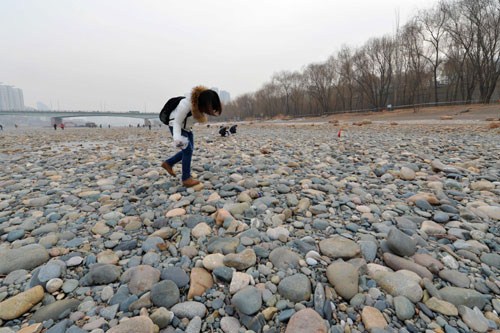Projects put water on tap in Gansu
 0 Comment(s)
0 Comment(s) Print
Print E-mail Xinhua, January 11, 2016
E-mail Xinhua, January 11, 2016
 |
|
A woman collects pebbles from the bed of the Yellow River in Lanzhou, northwest China's Gansu Province, yesterday. The section of river often runs dry in winter due to a lack of rain.?[Photo/Xinhua] |
For many years the only way for Wang Xiagui to get clean drinking water was to walk 5 kilometers to the other side of the mountain that towered over his small village in Gansu, an arid province in northwest China.
"A round trip took about an hour, so it was very inconvenient," he said.
Over the past decade, however, the provincial government has spent about 11 billion yuan (US$1.7 billion) on the development of projects to provide better access to clean water.
According to official figures, 96 percent of the residents of Weiyuan County, which encompasses Wang's village of Xiajie, are now connected to the main supply.
With an average rainfall of about 300 millimeters — about a quarter of the amount that falls in Shanghai — Gansu is known for its droughts.
Xiao Kecheng, a 59-year-old farmer, is another local who remembers the bad old days.
"There was not much water, so we had to queue at night," said the resident of Gaoshan Village.
People saved rainwater in their cellars, and in really dry years traveled into the towns and cities to buy water, which was a huge drain on their meager incomes, he said.
In 2005, a year after a study found that more than 15 million rural residents did not have access to safe drinking water, the provincial government launched a campaign to tackle the issue.
Since then, 6,069 major projects and 81,700 smaller ones have been completed. As a result, 80 percent of Gansu's rural population now has access tap water.
The projects have changed peoples' lives and supported the province's agricultural development.
"In the past I didn't dare raise many sheep, because getting drinking water for my family was hard enough without having to provide for animals too," said farmer Ma Jianying from the village of Bulenggou.
"Now I have more than 160 sheep," he said.
Local official Zhang Shihua said that while the water problem is "basically solved," challenges remain.
"Some projects are too small and can't guarantee enough water in bad weather conditions, so we will continue to improve the situation over the next five years," he said.





